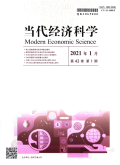当代经济科学2024,Vol.46Issue(2):59-74,16.DOI:10.20069/j.cnki.DJKX.202402005
数字经济发展、人力资本积累与劳动收入份额提升
Digital Economy Development,Human Capital Accumulation and Labor Income Share Increase
摘要
Abstract
Summary Labor income share stability is crucial for promoting common prosperity as it constitutes a significant portion of national income distribution.Digital technology's empowerment selectively facilitates factors entering various industries,thereby altering factor income distribution.The transformation of industrial structure inevitably influences labor income share.This paper examines whether the digital economy can elevate labor income share and the pivotal role of human capital accumulation in this context. Initially,a multi-sector static general equilibrium model elucidates the interplay among digital economy development,human capital accumulation,and labor income share.It highlights that the impact of digital economy development on labor income share hinges on factor substitution elasticity within industries.Human capital accumulation mitigates factor substitution elasticity in the service sector,thereby augmenting the digital economy's potential to enhance labor income share. Moreover,employing numerical simulations for quantitative analysis reinforces theoretical insights.It underscores that the elasticity of factor substitution within industries is pivotal in determining the impact of digital economy development on labor income share.Human capital accumulation,particularly in the service sector,fosters the positive effect of digital economy development on labor income share.Notably,high elasticity of capital and labor substitution within industries leads to a decline in labor income share,whereas reducing this elasticity in the service sector can reverse this trend. Subsequently,empirical tests utilizing panel data from 286 Chinese cities(2011-2020)reveal a U-shaped trend in the impact of China's digital economy development on labor income share,initially suppressing it before promoting it.Human capital accumulation significantly contributes to increasing labor income share,particularly when the human capital level exceeds 27.677.However,regional heterogeneity exists in this impact,and human capital accumulation does not uniformly regulate labor income share across all regions. This paper advances existing research in three aspects,first,by endogenously considering human capital accumulation's role in analyzing the impact of digital economy development on labor income share;second,by integrating digital economy development into a multi-sector general equilibrium model and depicting human capital accumulation's level through factor substitution elasticity;and third,by emphasizing the imperative of human capital accumulation in achieving common prosperity in the digital economy era.关键词
数字经济/人力资本/劳动收入份额/服务业/产业结构转型/共同富裕Key words
digital economy/human capital/share of labor income/service industry/industrial structure transformation/common prosperity引用本文复制引用
宋培,李琳,白雪洁..数字经济发展、人力资本积累与劳动收入份额提升[J].当代经济科学,2024,46(2):59-74,16.基金项目
国家社会科学基金重大项目"大国经济条件下构建自主可控的现代产业体系重大问题研究"(21&ZD099) (21&ZD099)
国家社会科学基金重点项目"后疫情时代我国卫生资源结构性失衡考察与优化配置路径研究"(21AJY012) (21AJY012)
南开大学文科发展基金重点项目"数字化与'鲍莫尔成本病'——理论反思与现实考察"(ZB22BZ0105). (ZB22BZ0105)

